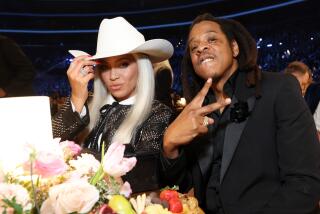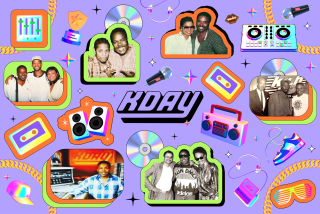BLACK-ONLY: FM STATION REJECTS IDEA
- Share via
SAN DIEGO — Darryl Cox doesn’t like to talk about prejudice, but it’s an issue he encounters almost daily as general manager of XHRM-FM (92.5), the only radio station in San Diego that is owned and operated by blacks.
Even though the station’s ratings have consistently been high--XHRM has always been in the Top 10 in the five years it has been on the air--many potential advertisers are still reluctant to purchase commercial time.
“The reason they almost always give us,” Cox said, “is that our format, urban contemporary, appeals mostly to blacks and other minorities.
“And they believe our listeners don’t spend as much money as the white listeners of Top 40 and rock stations,” and that’s simply not true, Cox said. “Every independent research study that’s been made shows that blacks actually spend more money on items that are traditionally advertised on radio, such as clothes, stereos, and even cars.
“Yet when our salesmen try to explain that to possible advertisers, the response is always the same: ‘Yeah, you have a lot of listeners, but most of your listeners make no money.’ ”
As a result, Cox said, XHRM for the last two years has made a conscious effort to attract more white listeners, with the blessing of station patriarch Willie Morrow, who purchased sales and programming rights to the Tijuana-licensed station in December, 1980, after having made a fortune with his California Curl line of hair care products.
Since January, 1984, Cox said, new equipment, including a transmitter, was brought in to improve the station’s sound. The format was tightened to include more hits by black artists like Michael Jackson, Prince and Lionel Richie, whose songs frequently cross over onto the more mainstream pop charts.
A more visible promotions approach was taken, with everything from on-air giveaways, public appearances by the station’s deejays and sponsorship of charity drives.
The station’s formerly all-black air staff was broadened to include a veritable ‘rainbow coalition’ of deejays, Cox said, that now includes one Italian, two Latinos and three white Americans.
And at the same time, the growing popularity of black artists on radio in general has further helped XHRM broaden its audience from its black core.
“Right now, black music is everywhere, just like it was in the 1960s,” Cox said. “People have been punked, acid rocked and heavy metaled to death, and they want to hear music that means something again.
“Today, you can’t program any type of station without at least some black music. Black artists dominate the Top 40, and even country stations are playing songs by people like Lionel Richie.
“And since black music has always been our strength, we naturally stand to gain a lot from all this added exposure.”
Indeed, XHRM already has, Cox said. According to the latest ratings breakdowns, more than half the station’s listeners are white.
And his assertion, he said, is backed by XHRM’s showing in the latest Birch ratings, which place it at No. 1 in the San Diego market with a 9.0 percentage share of listeners.
(While the quarterly Arbitron ratings--in which XHRM is tied with new music station XTRA-FM (91X) for seventh place with a 4.5 share--are still considered the industry standard, the Birch ratings are rapidly achieving respectability, if for no other reason than they tend to indicate upcoming Arbitron trends.)
“So now, when people try to tell us our audience is all black, we argue with simple logic,” Cox said. “Blacks right now account for about 7% of the county’s population.
“And if 9% of the county’s radio listeners tune in to XHRM, there’s no way they can all be black, even if the total population is the same as the total radio audience--which every ratings report says it’s not. There just aren’t that many blacks.”
Still, Cox conceded, it’s an uphill battle.
“If we continue to be consistent, and if we continue our high level of visibility in the community, then the community in turn will give us their respect,” Cox said.
“And once we get that respect, we’re going to get the (advertising) revenue. We’ve just got to let people know we’re here, and not let them close their eyes and overlook us anymore.”
More to Read
Sign up for Essential California
The most important California stories and recommendations in your inbox every morning.
You may occasionally receive promotional content from the Los Angeles Times.













